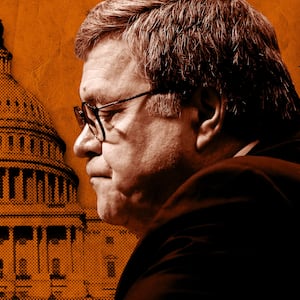The impact of Attorney General William Barr’s intervention in the Roger Stone sentencing won’t just be felt in the cases concerning President Donald Trump’s allies, current and former Justice Department officials warn. It’s cost the Justice Department one of its top public-corruption prosecutors at a time when public corruption is looking like a growth industry.
That attorney is Jonathan Kravis. Kravis is the deputy chief of the fraud and public corruption section of the U.S. Attorney’s Office for the District of Columbia, putting corruption within the federal government under his purview.
Or he was until Tuesday, when Kravis resigned. The last straw for Kravis, who was part of Robert Mueller’s team that convicted Roger Stone of charges including lying to Congress, was the Justice Department overruling him on the recommended length of Stone’s prison sentence. Unlike his three outraged fellow prosecutors, Kravis didn’t just quit the Stone case, he quit the Justice Department.
ADVERTISEMENT
“It’s troubling and heartbreaking to see someone as talented and dedicated as Jonathan was known to be leaving under these circumstances,” said a federal prosecutor who requested anonymity during a precarious moment for the Justice Department. “His loss is all the greater given his focus on prosecuting fraud and corruption, at a time when both crimes appear to be on the march.”
Before joining Robert Mueller’s team investigating Russian election interference and its connections to Trumpworld, Kravis, who had also served in the Justice Department’s public-integrity section, scored several anti-corruption victories against high-profile targets. In 2016, he helped convict former Pennsylvania Democratic Congressman Chaka Fattah on a host of charges including bribery, wire fraud and racketeering. A year earlier, he helped prosecute three aides to Ron Paul’s 2012 presidential campaign for effectively bribing an Iowa state senator to endorse Paul ahead of the Iowa caucus.
“He was probably one of the best public integrity prosecutors this country has,” a former colleague, Glenn Kirschner, told MSNBC’s Lawrence O’Donnell after the Stone prosecutors quit.
Kravis did not immediately respond to a message seeking comment.
Just as important as Kravis himself is the position that he held. The public-corruption section within the U.S. Attorney’s Office for the District of Columbia has widespread prosecutorial authority over the federal government, as well as election activities. “In this administration, it along with SDNY [the Southern District of New York] are the two most important venues for public corruption prosecutions. It’s a significant loss to that office,” said Kathleen Clark, a law professor at Washington University in St. Louis.
And it comes at a time when there is no shortage of public-corruption targets. Noah Bookbinder, the executive director of the Center for Responsibility and Ethics in Washington and a former Justice Department public-integrity line prosecutor, pointed to the president’s conflicts of interests deriving from the retention of his business empire as an early signal of toleration for brazen public graft.
“There’s corruption at the federal government at a level we’ve perhaps never seen before,” Bookbinder said. “Somebody like Kravis resigning under the circumstances he did, and the entire team on the Stone prosecution withdrawing, is pretty clearly a protest that these line prosecutors believe DOJ was interfering for political reasons.” The Justice Department has spent all week denying the allegation.
Stephen Gillers, a law professor at New York University, said Kravis’ departure was “bad for the nation,” but considered its broader importance to be what it augurs for the independence of the Justice Department.
“In light of Barr’s change in the sentence recommendation for Stone, after Trump voiced his displeasure, this norm can no longer be assumed,” Gillers said. “That reality will discourage not only lawyers now working at DOJ from remaining, but also discourage good applicants who do not want to join a Department where their decisions may be subject to political interference.”
“When someone like Jonathan Kravis leaves the office,” said Barbara McQuade, a former U.S. attorney, “that means he will be replaced by someone hired by the new U.S. attorney, Timothy Shea, whose conduct today does not instill a lot of confidence in his integrity, in contrast to Jonathan Kravis, whose conduct is consistent with the best traditions of the independence of the Department of Justice.” (Shea is a former Barr aide whom Barr recently installed as acting U.S. attorney for D.C.)
CREW’s Bookbinder added that losing respected public-corruption prosecutors poses a unique challenge. Their high-profile, politically powerful targets frequently argue in court that the prosecutors themselves are corrupt. “You really need people with expertise and credibility who can come in and do those cases and not have anyone question what their agenda is,” Bookbinder said.
But instead, said Joshua Geltzer, a former Justice Department national-security official, “you’re seeing more people leave who dislike Trump and more [loyalists] coming in. Trump brought such a politicized, polarized vision about who runs the executive branch that his effect on those leaving and entering the federal workforce is more dramatic than previous presidents.”
After Senate Republicans saved Trump from impeachment, the president and his allies accelerated their efforts at making Main Justice an adjunct of the White House. In addition to the Stone sentencing reversal, Barr is now undercutting Mueller’s guilty plea from former Trump national security adviser Michael Flynn, for lying to the FBI. Former acting attorney general Sally Yates, whom Trump fired after she warned that Flynn was a counterintelligence liability, wrote in The Washington Post on Friday that the president was using the Justice Department for “retribution or camouflage.”
“The president has made it clear that his insistence on loyalty includes loyalty from the institutions that administer criminal justice, including DOJ and the FBI,” said NYU’s Gellers. “You might say without exaggeration that Trump wants personal loyalty from the rule of law itself.”







